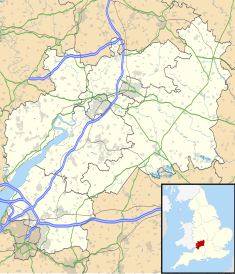
Tewkesbury is a market town and civil parish in the north of Gloucestershire, England. The town grew following the construction of Tewkesbury Abbey in the twelfth century and played a significant role in the Wars of the Roses. It stands at the confluence of the River Severn and the River Avon, and thus became an important trading point, which continued as railways and, later, the M5 and M50 motorway connections were established. The town gives its name to the Borough of Tewkesbury, a local government district of Gloucestershire. The town lies on the border with Worcestershire, marked largely by the Carrant Brook.
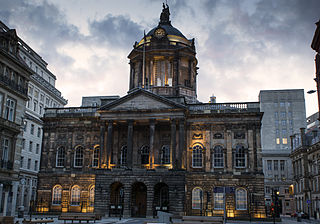
Liverpool Town Hall stands in High Street at its junction with Dale Street, Castle Street, and Water Street in Liverpool, Merseyside, England. It is recorded in the National Heritage List for England as a designated Grade I listed building, and described in the list as "one of the finest surviving 18th-century town halls". The authors of the Buildings of England series refer to its "magnificent scale", and consider it to be "probably the grandest ...suite of civic rooms in the country", and "an outstanding and complete example of late Georgian decoration".
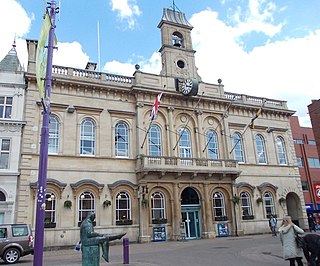
The Loughborough Town Hall is a building fronting onto the Market Place in Loughborough, Leicestershire, England. Built as a corn exchange and ballroom in 1855, it later became a municipal building and subsequently a theatre. It is a Grade II listed building. The building is still used for full council meetings of Charnwood Borough Council.
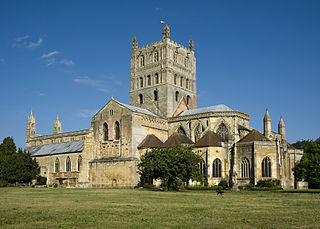
The Borough of Tewkesbury is a local government district with borough status in Gloucestershire, England. The borough is named after its largest town, Tewkesbury, which is where the council is based. The district also includes the town of Winchcombe and numerous villages including Bishops Cleeve, Ashchurch, Churchdown, Innsworth and Brockworth as well as other hamlets and surrounding rural areas. Parts of the district lie within the Cotswolds Area of Outstanding Natural Beauty.

The Old Town Hall, Richmond on Whittaker Avenue in Richmond, London is a former municipal building which from 1893 to 1965 served as the town hall for the Municipal Borough of Richmond.

Acton Town Hall is a municipal building in High Street, Acton, London, England. It is a Grade II listed building.
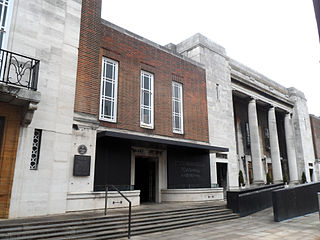
Stoke Newington Town Hall is a municipal building in Church Street, Stoke Newington, London. It is a Grade II listed building.

The Town Hall, Christchurch is a municipal building in Christchurch, Dorset, England. The building, which incorporates a room known as the mayor's parlour on the first floor, and is a Grade II listed building. It is currently the base of Christchurch Town Council.

Bideford Town Hall is a municipal building at the corner of Bridge Street and New Road in Bideford, Devon, England. The building, which is the meeting place of Bideford Town Council and is also used for some meetings of Torridge District Council, is a Grade II listed building.
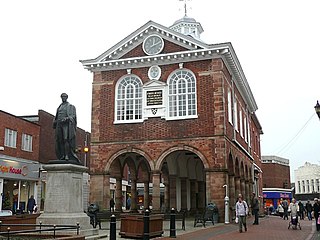
Tamworth Town Hall is a municipal building in Market Street, Tamworth, Staffordshire, England. The town hall, which is the meeting place of Tamworth Borough Council is a Grade II* listed building.

Llanelli Town Hall is a municipal building in Church Street, Llanelli, Carmarthenshire, South Wales. The town hall, which was the headquarters of Llanelli Borough Council, is a Grade II listed building.

The Municipal Buildings are based on the north side of Buccleuch Street, Dumfries, Dumfries and Galloway, Scotland. The structure, which was the headquarters of Dumfries Burgh Council, is a Category C listed building.
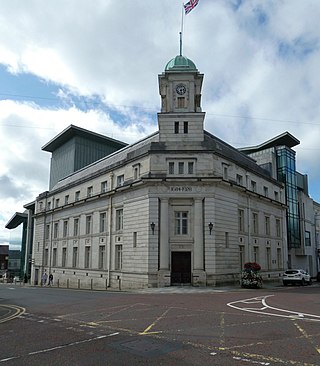
Ballymena Town Hall is a municipal structure in Bridge Street in Ballymena, County Antrim, Northern Ireland. The town hall, which is the headquarters of Mid and East Antrim Borough Council, is a Grade B1 listed building.

Farnham Town Hall is a municipal building in South Street, Farnham, Surrey, England. It provides the offices and the meeting place of Farnham Town Council.
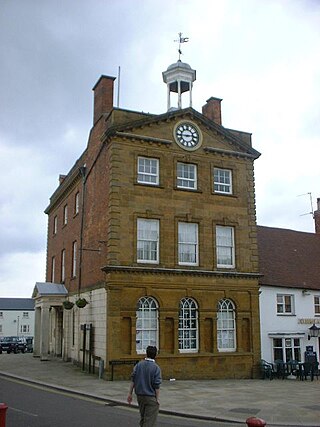
The Moot Hall is a municipal building in Chapel Lane in Daventry, Northamptonshire, England. The building, which was the headquarters of Daventry Borough Council, is a Grade II* listed building.

Tiverton Town Hall is a municipal building in St Andrew Street in Tiverton, Devon, England. The structure, which was the meeting place of Tiverton Borough Council, is a Grade II listed building.

Helston Guildhall, formerly Helston Town Hall, is a municipal building on Market Place, Helston, Cornwall, England. The structure, which is the meeting place of Helston Town Council, is a Grade II* listed building.
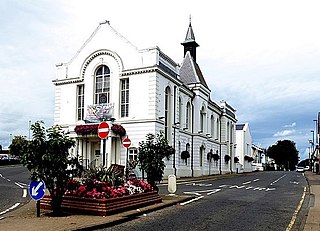
Ballymoney Town Hall is a municipal structure in the High Street, Ballymoney, County Antrim, Northern Ireland. The structure, which incorporates a local history museum, is a Grade B1 listed building.

Forres Town Hall is a municipal structure in the High Street, Forres, Moray, Scotland. The structure, which was the meeting place of Forres Burgh Council, is a Category B listed building.
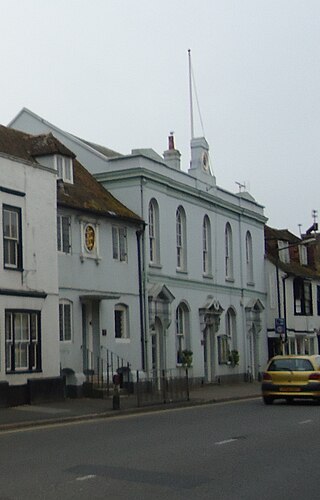
New Romney Town Hall is a municipal structure in the High Street, New Romney, Kent, England. The structure, which is the meeting place of New Romney Town Council, is a Grade II listed building.

